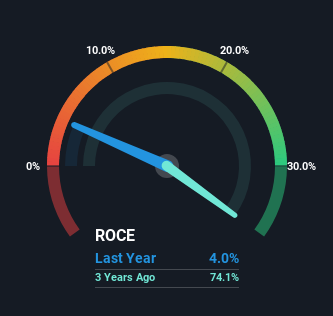- United States
- /
- Consumer Durables
- /
- NYSE:VZIO
The Returns On Capital At VIZIO Holding (NYSE:VZIO) Don't Inspire Confidence
What are the early trends we should look for to identify a stock that could multiply in value over the long term? Firstly, we'd want to identify a growing return on capital employed (ROCE) and then alongside that, an ever-increasing base of capital employed. If you see this, it typically means it's a company with a great business model and plenty of profitable reinvestment opportunities. Although, when we looked at VIZIO Holding (NYSE:VZIO), it didn't seem to tick all of these boxes.
What Is Return On Capital Employed (ROCE)?
If you haven't worked with ROCE before, it measures the 'return' (pre-tax profit) a company generates from capital employed in its business. Analysts use this formula to calculate it for VIZIO Holding:
Return on Capital Employed = Earnings Before Interest and Tax (EBIT) ÷ (Total Assets - Current Liabilities)
0.04 = US$16m ÷ (US$842m - US$441m) (Based on the trailing twelve months to March 2023).
Thus, VIZIO Holding has an ROCE of 4.0%. Ultimately, that's a low return and it under-performs the Consumer Durables industry average of 17%.
See our latest analysis for VIZIO Holding

Above you can see how the current ROCE for VIZIO Holding compares to its prior returns on capital, but there's only so much you can tell from the past. If you'd like, you can check out the forecasts from the analysts covering VIZIO Holding here for free.
SWOT Analysis for VIZIO Holding
- Currently debt free.
- No major weaknesses identified for VZIO.
- Annual earnings are forecast to grow faster than the American market.
- Trading below our estimate of fair value by more than 20%.
- Revenue is forecast to grow slower than 20% per year.
The Trend Of ROCE
On the surface, the trend of ROCE at VIZIO Holding doesn't inspire confidence. Over the last five years, returns on capital have decreased to 4.0% from 14% five years ago. And considering revenue has dropped while employing more capital, we'd be cautious. This could mean that the business is losing its competitive advantage or market share, because while more money is being put into ventures, it's actually producing a lower return - "less bang for their buck" per se.
On a side note, VIZIO Holding has done well to pay down its current liabilities to 52% of total assets. So we could link some of this to the decrease in ROCE. Effectively this means their suppliers or short-term creditors are funding less of the business, which reduces some elements of risk. Since the business is basically funding more of its operations with it's own money, you could argue this has made the business less efficient at generating ROCE. Either way, they're still at a pretty high level, so we'd like to see them fall further if possible.
The Key Takeaway
In summary, we're somewhat concerned by VIZIO Holding's diminishing returns on increasing amounts of capital. Investors haven't taken kindly to these developments, since the stock has declined 13% from where it was year ago. That being the case, unless the underlying trends revert to a more positive trajectory, we'd consider looking elsewhere.
Like most companies, VIZIO Holding does come with some risks, and we've found 1 warning sign that you should be aware of.
For those who like to invest in solid companies, check out this free list of companies with solid balance sheets and high returns on equity.
New: Manage All Your Stock Portfolios in One Place
We've created the ultimate portfolio companion for stock investors, and it's free.
• Connect an unlimited number of Portfolios and see your total in one currency
• Be alerted to new Warning Signs or Risks via email or mobile
• Track the Fair Value of your stocks
Have feedback on this article? Concerned about the content? Get in touch with us directly. Alternatively, email editorial-team (at) simplywallst.com.
This article by Simply Wall St is general in nature. We provide commentary based on historical data and analyst forecasts only using an unbiased methodology and our articles are not intended to be financial advice. It does not constitute a recommendation to buy or sell any stock, and does not take account of your objectives, or your financial situation. We aim to bring you long-term focused analysis driven by fundamental data. Note that our analysis may not factor in the latest price-sensitive company announcements or qualitative material. Simply Wall St has no position in any stocks mentioned.
About NYSE:VZIO
VIZIO Holding
Through its subsidiaries, provides smart televisions, sound bars, and accessories in the United States.
Flawless balance sheet with reasonable growth potential.
Similar Companies
Market Insights
Community Narratives



